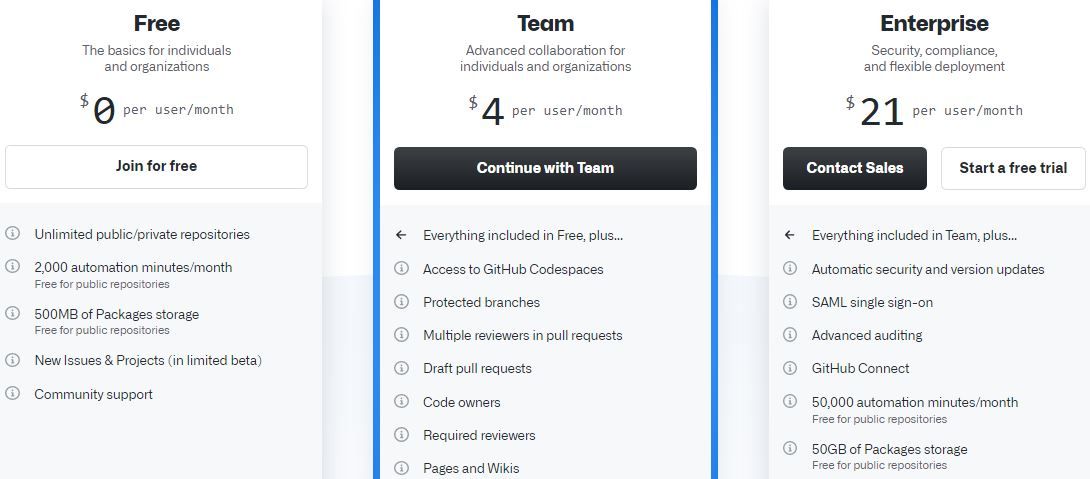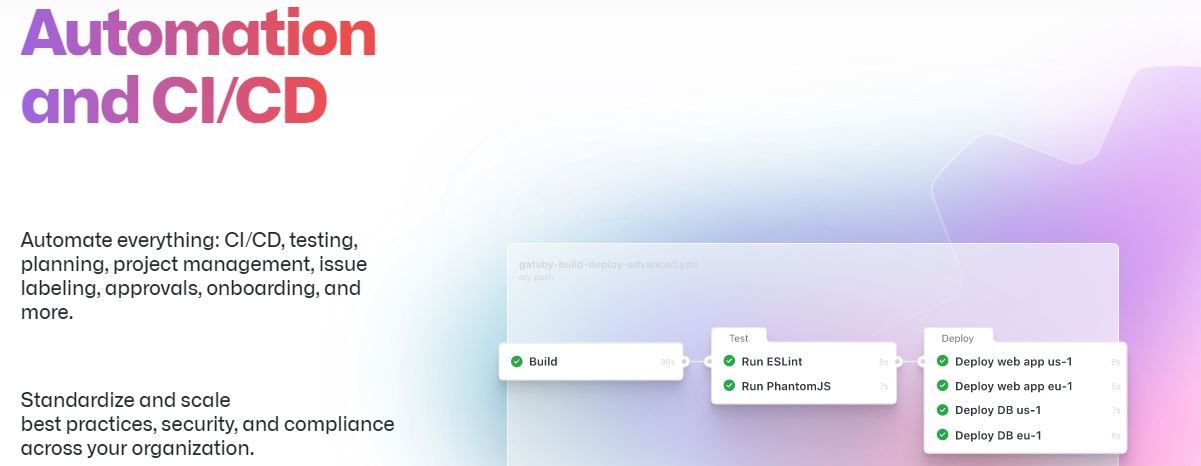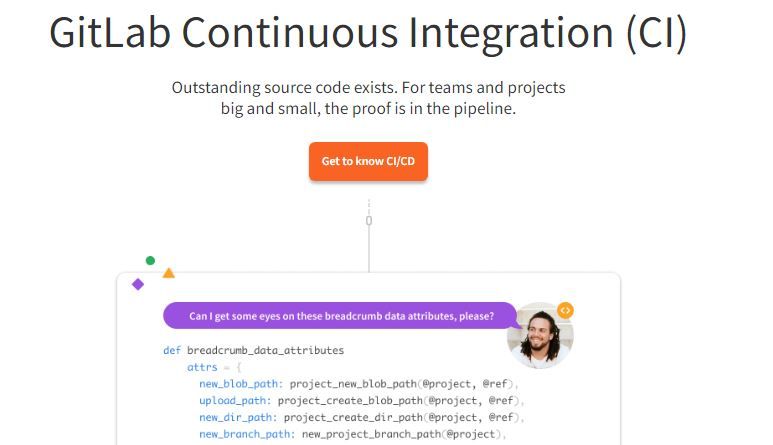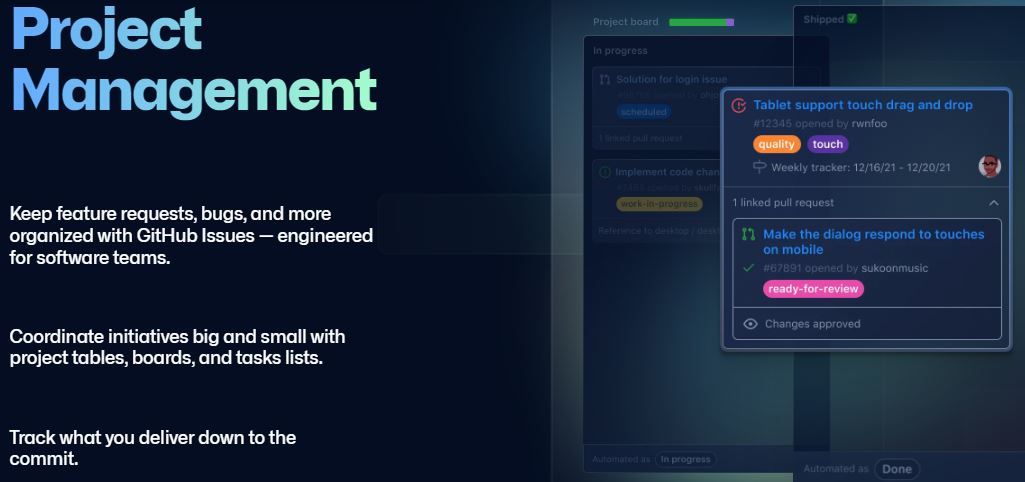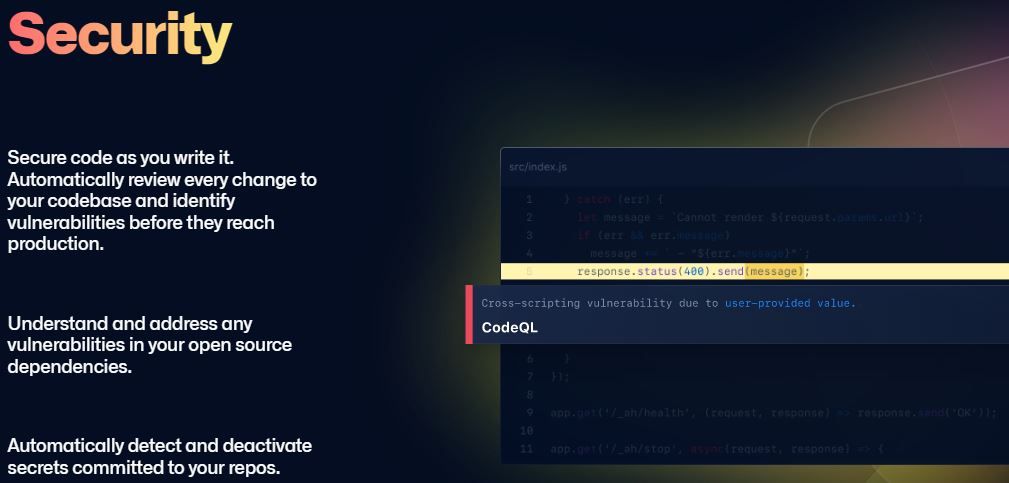If you find it hard to pick between GitLab and GitHub, your indecisiveness is valid. Both platforms provide outstanding results in git version control for private or open source software.
Although both are competent enough, this very competence makes it hard to choose which of the two will work for you and your team. To help you decide, consider characteristics like price, features, CI and CD, and more.
1. Price Comparison
Pricing is an important consideration to make. You want to spend considerably less money on more features at any point in time.
GitHub comes with three essential pricing plans. The first is a free plan bundled with unlimited public and private repositories. It also offers 2,000 CI/CD minutes monthly community support, and 500MB worth of storage.
There's also the Teams plan, which costs $4 per month, per year. The most important features of this plan are 3,000 CI/CD minute monthly multiple reviewers in pull-in requests, draft requests, code owners, and 2GB storage.
You can also get the Enterprise plan for $21 per month, per user. Aside from having all the features in the free and Teams plans, this plan gives you 50,000 CI/CD minutes per month. Additionally, it has Audit Log API and GitHub Connect, which are essential.
On the other hand, GitLab also has three price plans: the Free plan, the Premium plan, and the Ultimate plan. The free plan has all stages of the DevOps cycle and allows you to bring your own GitLab CI runners. It also comes with 400 CI/CD minutes monthly.
You can equate GitLab's Premium plan with GitHub's Enterprise plan. This Premium plan costs $19 per user monthly, with 10,000 minutes and project management resources being its most enticing offerings.
If you want to experience GitLab's best features, you need to upgrade to the Ultimate plan. The Ultimate plan charges $99 for every user every month. For this price, you'll get additional features like advanced security testing and portfolio management.
So GitHub is cheaper than GitLab. But GitLab's Ultimate plan has features that you can only get from GitHub if you purchase Advanced Security Enterprise Server or Enterprise Cloud.
Even then, GitHub still doesn't have in-built features like fuzz testing. GitHub will cost you less, but GitLab will give you more.
2. Feature Breakdown
GitHub's features are pretty similar to GitLab since they're both essentially version control platforms for git. What separates the two is how users get access to the features available.
On GitHub, you might need apps and third-party integrations more frequently to access features like continuous integration and delivery, time tracking and load, and browser performance testing.
GitLab, on the other hand, offers a lot more and is more direct. You can check out a detailed list of the available features on GitLab's pricing page. All you need to do is make sure your plan can support the features you need.
3. CI And CD Comparison
Initially, GitLab was the one that offered Continuous Integration and Delivery (CI/CD). GitHub followed in its tracks not too long after and began offering it to clients as well.
GitHub's CD only works with third-party plugin integrations such as Heroku. This is the same case for container registry and security scanning on the platform. You will also have to manually configure pipelines on GitHub because they don't come pre-configured.
GitLab, on the other hand, does not require third-party integrations at any point, making it easier to manage. It also pre-configures its pipeline integrations and allows parent and child pipelines to run simultaneously. Additionally, the AUTO DevOps feature makes security scans and licensing issues easier and simplifies Kubernetes deployment to the cloud.
4. Code Creation and Versioning
The most significant difference between GitHub and GitLab for code creation and versioning is the Integrated Development Environment (IDE). An IDE is essentially an editor-like app that simplifies the process of making changes to your projects.
Unfortunately, GitHub doesn't come with its IDE unless you use a third-party integration. However, you can quickly get codespace creation on GitHub. These cloud-hosted development environments make development easier for your team and give you access to compute resources on the cloud.
GitLab, however, has WebIDE. This means your team of developers can easily collaborate and build apps from scratch using web-based resources. You and your team can also make stark comparisons of the apps you've developed and the changes made to them. This makes workflow faster and more efficient.
5. Project Management
As far as project management is concerned, GitHub is well equipped. First, it allows you to pull requests, make notes on specific projects and categorize issues. You can also use the reports and charts available to determine productivity and can even set the milestones you want to achieve.
GitLab is just as effective; it allows you to easily allocate tasks to different team members so that everyone knows what's expected. In addition to that, GitLab has burndown charts to help your team visualize the tasks at hand.
There are plenty more project management features available in both GitLab and GitHub, and they're equally good. The GitLab vs. GitHub debate has to settle for a tie in terms of project management features.
6. Security Features
Security is of the utmost importance to any project so, whether you choose GitHub or GitLab, it must have foolproof security, scanning, and DevSecOps.
GitHub has an outstanding event-trigger scan feature that beefs up security for your projects. You can also customize your vulnerability definitions and automate a schedule for your security scans. Add that to the Static Application Security Testing feature, and you will be very satisfied.
Although GitLab does not come with an event-triggered scan, it matches GitHub with the SAST feature. GitLab also has Dynamic Application Security Testing (DAST) and API fuzzing which aren't available on GitHub. It has inbuilt IAC scanning, container testing, and license compliance features.
Topping it off is GitLab's vulnerability risk indicator. This classifies risks as critical, high, medium, or low so that you can gauge the severity of a security risk.
While GitHub has robust security features, GitLab outperforms it in terms of the extensive built-in security tools available. That said, GitLab takes the lead in DevSecOps and security scanning matters.
GitHub vs. GitLab: Find the Best DevOps Platform
Getting started with DevOps tools isn’t easy. It isn't the usual "what works for one works for all" scenario either. If anything, the best platform is one that meets your team's needs and unique demands. GitHub is a market leader with a considerable number of apps and integrations. It's great for project management and will not disappoint when it comes to its pricing.
On the flip side, GitLab has more premium features, incredible security, easier code creation, and versioning abilities. However, these extra features might prove to be relatively more costly. We recommend choosing based on what you need, that's the only wake to make the most out of each platform.


